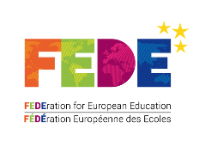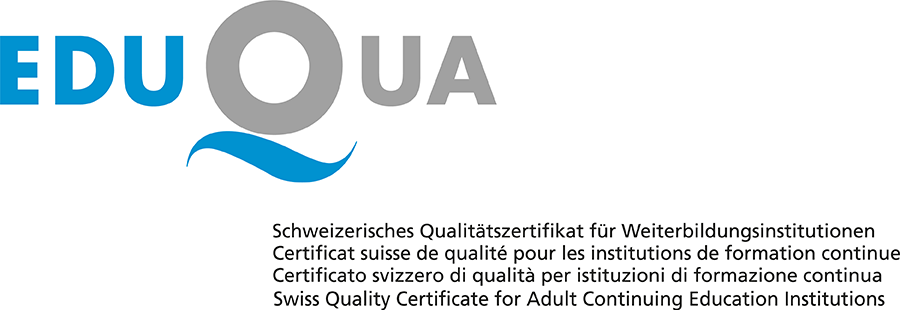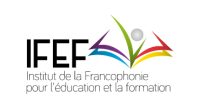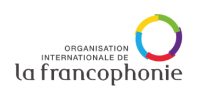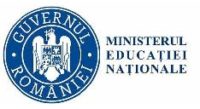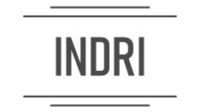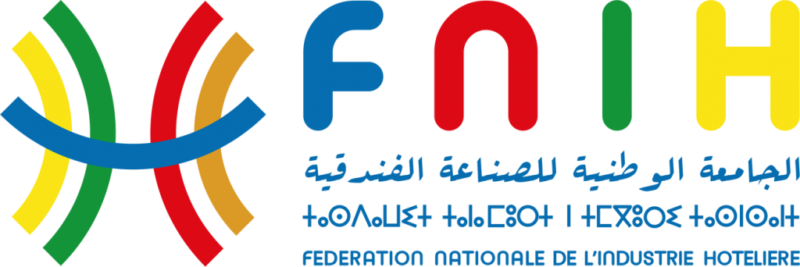RECOGNITION AND QUALIFICATIONS
eduQua
Founded in the 2000s by the Swiss Federation for Adult Learning (FSEA), the eduQua label is designed to meet the needs of the job market and help recruiters identify the most appropriate training organisations.
The label certifies the quality of training institutions on the basis of six criteria: the programmes offered, their quality, the information made available, the quality of the teachers, the quality assurance system, and the orientations of the institution.
The eduQua label guarantees the quality of an institution and constitutes a real asset for young professionals looking for a job.
eduQua certification covers the following: continuing education adults, applicable to teachers and staff at FEDE-member institutions.
The FEDE’s eduQua certification does not cover educational programmes offered by FEDE member institutions.
FEDE members are not authorised to refer to this certification in their internal or external communications unless they are themselves certified by eduQua.
Information on programmes is up to date, appropriate, understandable and accessible to members.
France compétences
France Compétences, a French government agency established by a law of 5 September 2008, has managed the RNCP (Répertoire National des Certifications Professionnelles) and RS (Répertoire Spécifique (RS) – national lists of state-recognised training programmes – since 1 January 2019.
France Compétences was set up in order to improve the efficacy of the professional training and apprenticeship market.
It has three main objectives: financing the professional training and apprenticeship system in an optimal and enduring way; regulating the market by encouraging the identification of skills needs and advancing economic and teaching models; and improving transparency and synergies between professional training and apprenticeship actors.
As part of its work, France Compétences studies requests for registration in the RNCP and RS according to the criteria laid down in a decree of 18 December 2018 concerning the conditions for registering professional qualifications, certificates and accreditations in the national lists.
The FEDE’s Examinations Centre currently offers several qualifications registered in the RNCP and RS.
ALTE
Founded in 1989 by the University of Cambridge and the University of Salamanca, ALTE (Association of Language Testers in Europe) is a British INGO made up of Europe’s language-certification bodies.
This official network promotes accurate testing of language skills in Europe and beyond. The FEDE has been an ALTE institutional affiliate since 2019. It collaborates on ALTE projects and benefits from its linguistic expertise, which constitutes a guarantee of quality.
FEDE offers a Modern European Language Certificate that assesses the four oral and written comprehension and expression skills used in language testing.
It provides proof of modern language skills as well as the ability to use a foreign language effectively in key workplace situations.
IFEF
Having assembled in Dakar 2014 for the 15th Summit of the International Organisation of La Francophonie, the heads of state and government of the OIF’s Member States decided to equip the organisation with a tool to support countries in their efforts to improve their educational systems: the Institut de la Francophonie pour l’Education et la Formation (IFEF).
Based in Dakar, the IFEF organises cooperation programmes in the education sector, prioritising basic and vocational and technical education.
The IFEF builds the capacity of OIF Members States and its partners to improve the quality of teaching programmes in French. It also organises capacity-building activities for teachers and supervisory, administrative and managerial staff working in the education sector.
In November 2018, a partnership agreement signed between the FEDE and the IFEF officially recognised the quality of the FEDE’s French Language Certificate.
Romanian Ministry of Education
Since December 2019, the Romanian Ministry of Education has officially recognised the FEDE’s Modern Language Certificate and accepts obtention of the certificate in lieu of its baccalaureate-level language exam.
The FEDE Certificate is now included in Romania’s official list of international examinations recognised for levels B1, B2 and C1 in the six modern European languages offered by the FEDE: English, German, Spanish, French, Italian and Portuguese.
Consequently, high-school students in Romania can present a FEDE Language Certificate instead of taking the international language tests that form part of their baccalaureate (high school leaving diploma) requirements.
Institut national de Diplomatie et des Relations internationales (INDRI), Cambodia
Founded in 2016, the INDRI is affiliated with the Ministry for Foreign Affairs and International Cooperation of the Kingdom of Cambodia.
It trains diplomats and aims to become the country’s centre of excellence for diplomatic training and its key forum for reflection on international affairs.
As part of its foreign-language training, the INDRI signed a memorandum of understanding with the FEDE on 23 September 2021.
This agreement provides the INDRI with the status of FEDE-affiliated language centre, allowing it to offer courses training learners for the FEDE Certificate in all six European languages on offer: English, German, Spanish, French, Italian and Portuguese.
FEEF
The Fédération des Entreprises et des Entrepreneurs de France (FEEF) is an important French professional federation with over 900 member businesses. It represents regional SMEs that supply food and non-food products to distributors.
Action: Through an agreement signed in 2018, the FEEF and the FEDE have demonstrated their commitment to the training of young people and have strengthened links between businesses and the FEDE’s international network of graduates.
The FEEF officially recognises the professional quality of the FEDE’s European degrees in business management. This strategic partnership is intended as a careers springboard for FEDE graduates. It improves their job prospects and facilitates connections between FEDE members and FEEF-member businesses.
FNIH
Founded in 1962, the Fédération Nationale de l’Industrie Hôtelière (FNIH) is composed of the 12 regional associations representing the hotel industry (the ARIH) and hotel chains that run 3600 accommodation sites across Morocco.
The FNIH aims to promote the interests of hotels: it represents them before the public authorities, provides them with information and advice, and offers assistance with administrative procedures.
Working in partnership with its members, the FNIH plays a role in staff training, tourist health and safety, the management of hotel professions, and the promotion of tourism in Morocco.
Action: Through an agreement signed in 2019, the FNIH recognises the relevance and quality of the FEDE’s educational programmes and degrees targeting the hospitality sector: the Foundation Degree in Tourism and Hospitality, the European Bachelor’s in Tourism and Hospitality, the European Bachelor’s in Spa Business Management, and the European Master’s in Tourism: Management and Strategy.
The FNIH-FEDE partnership also promotes the development of the hospitality and tourism industries in Morocco, which constitute the country’s second-largest job provider and contributor to GDP.
